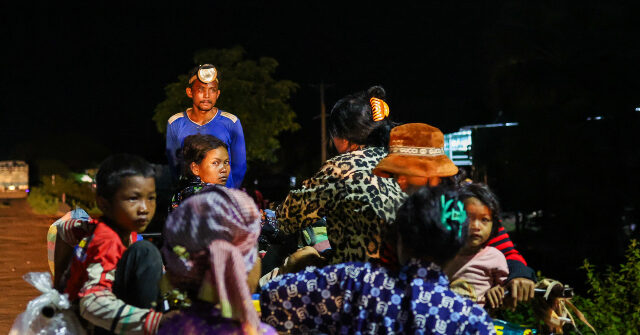Armed military clashes between Thailand and Cambodia over a 117-year-old territorial dispute have left at least 20 dead in Thailand and more than 130,000 displaced as of Friday morning, Thai acting Prime Minister Phumtham Wechayachai reportedly said.
The neighboring Asian nations have maintained a territorial dispute since 1907, when Cambodia was under French colonial rule. Thailand has historically maintained that the current borders, first drawn at that time, are inaccurate, while Cambodia has defended the legitimacy of the drawn border lines to claim the contested territory. After eight decades under French rule, Cambodia obtained its independence from France in 1953.
Tensions progressively rose over the past weeks after Cambodia denounced in late May that one of its soldiers was killed after a brief exchange of gunfire with Thai soldiers at the contested border area. The tensions erupted into rapidly escalating military skirmishes on Thursday. Reports indicated that clashes erupted across 12 different locations with both sides progressively using heavier weapons and artillery, marking the worst clash between the two countries in 13 years.
Each country has blamed the other for starting the conflict. Thailand accused Cambodia of deliberately attacking civilians, and Cambodia accused Thailand of using widely prohibited cluster munitions in the conflict as of this week.
Thailand’s acting Prime Minister Wechayachai declared a state of martial law in eight districts bordering Cambodia and warned on Friday morning that the fighting could “move towards war,” as clashes were now spread across 12 locations along the border. The United Nations Security Council is reportedly scheduled to hold an emergency meeting to address the ongoing crisis on Friday.
Thailand’s Foreign Ministry spokesperson Nikorndej Balankura told Reuters on Thursday that although the United States, China, and Malaysia have offered to facilitate dialogue, Bangkok is seeking a bilateral solution with Cambodia and prefers to hold direct talks with the neighboring nation. The official stressed, “I don’t think we need any mediation from a third country yet.”
Hours later, on Friday, the Thai government reportedly “agree[d] with in principle and will consider” a mediation offer extended by Malaysian Prime Minister Anwar Ibrahim in his capacity as the current chair of the Association of Southeast Asian Nations (ASEAN).
“However, it must be stated that throughout the day, Cambodian forces have continued their indiscriminate attacks on Thai territory. Any ceasefire must be based on appropriate on-the-ground conditions,” Thailand’s Foreign Ministry said on social media.
“Thailand places utmost priority on the safety and security of civilians, and at this moment, Cambodia’s actions demonstrate a lack of good faith and continue to place civilians in danger. The Royal Thai Government has the obligation to protect its sovereignty and its people to the fullest extent,” the Ministry continued.
On Thursday, Cambodian Prime Minister Hun Manet, who received the position after his father Hun Sen stepped down, claimed in a statement that the key to resolving the conflict is Thailand’s willingness to accept a ceasefire and asserted that Thailand had allegedly withdrawn from an initially agreed-upon ceasefire offer promoted by the Malaysian government.
“Therefore, the key to resolving the current armed conflict between Thailand and Cambodia is the genuine willingness of the Thai side to accept a ceasefire, which is the first step towards funding [sic] further solutions between the two countries,” Hun Manet said.
The U.S. State Department released a brief statement on Thursday expressing its concerns over the ongoing conflict between Thailand and Cambodia and strongly urged the “immediate cessation” of the attacks, protection of civilians, and peaceful settlement of disputes.
Christian K. Caruzo is a Venezuelan writer and documents life under socialism. You can follow him on Twitter here.
Read the full article here


